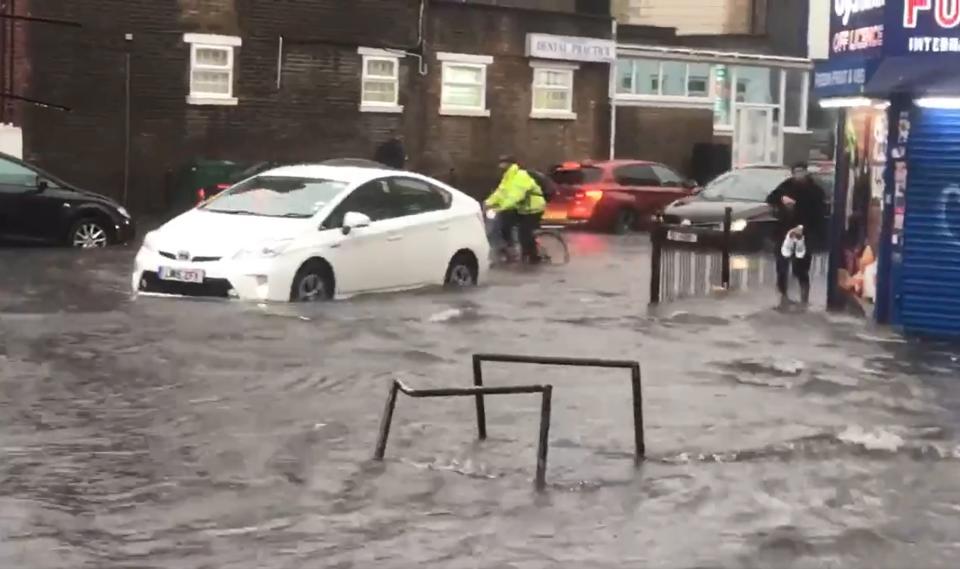It is time to take even more drastic measures to save the planet – here’s what we need to do

“All changed, changed utterly: A terrible beauty is born.” When I think about this month’s weather catastrophes across the globe, the sombre lines of William Butler Yates poem, Easter, 1916, come to mind.
That’s because what has happened this month has utterly changed the nature of the climate emergency. Some scientists and climate protectors have long warned that the computer models being used to predict the outcomes of ever-rising carbon emissions did not adequately take account of non-linear impacts on the climate. They were potentially underestimating the peril that humanity and nature are in.
The temperature records in British Columbia that left the town of Lytton a blackened skeleton – and boiled alive one billion sea-animals, were not broken by just by a fraction of a degree (by one degree or even two degrees centigrade) but by a truly shockingfive degrees.
The biblical deluge that poured down on the Rhineland Palatinate, sweeping away entire homes and lives, was not simply a week’s or month’s worth of rain, but an entire two months’ worth of average rainfall in a single day.
Numerous scientists have expressed shock at how these figures were completely outside those typically expected by the models. Many said they truly did not expect this type of extreme weather to hit until the 2050s. These extremes have been put down by some scientists to the unexpected stalling impacts on the jet stream far up in the atmosphere in the northern hemisphere; by the rapid overheating of the Arctic and Pacific ocean, which is heating more rapidly than the rest of the planet.
If this thesis proves to be true, it means that almost nowhere under the path of the jet streams (much of the northern hemisphere) is safe from such devastating extremes threatening human life, civilisation and what is left of nature. Tragic extreme weather events this July were almost simultaneously happening across the globe from California to India, from China to Myanmar.
But will people, communities, businesses and governments react with the urgency needed to this new terribly heightened threat? My fear is that they will not – if London’s drivers are anything to go by. Torrential downpours revisited London on Saturday. For the second time in a month, a wall of water poured down from the heavens.
Thankfully, my home in Camberwell remained unflooded. We had successfully pressed our local Southwark Council to put in flood protection measures about four years ago, as we were in a vulnerable low-lying area. But on Twitter, I was seeing streets, homes and even train-stations flooded all over the capital – and videos of foolhardy drivers ploughing straight into the floodwaters, stalling and then finding themselves in danger of drowning.
This behaviour is a perfect analogy for the heads of our governments, banks, media-corporations and oil corporations, who are driving our planet headlong into climate catastrophe – despite seeing the destruction ahead.
These oil corporations, despite their own scientists warning for decades that fossil fuels would lethally disrupt the climate, are planning trillions of new fossil fuel investments over the coming decade – and the banks are pouring in trillions in loans required to fund this expansion.
Certain sections of the media are promoting ever more flying, driving, meat-eating and consumerism. And our governments are planning the expansion of airports, roads, industrial livestock farms and industrialisation. Above all of these, the UNFCCC is calling for a net-zero carbon global economy by 2050: 62 years after what some say was the passing of the safe level of 350 parts per million of CO2 in the atmosphere – in 1988.
We’ve heard the voices of millions of Greta Thunbergs – student climate strikers and the peaceful direct actions of thousands of arrested Extinction Rebellion climate protectors on extreme weather – but even they were, if anything, underestimating the threat.
So, what must now happen in this terrible new world where extreme weather can suddenly and catastrophically destroy any of our families and communities? Individually, we all must lead by example and stop all non-essential flying, driving, meat-eating and consumerism – and voluntarily keep our families to less than two if at all possible.
The terrible truth of these weather extremes is that climate protectionism now needs to be a foremost part of all our lives, for the rest of most of our lives; no matter who we are or what role we play in society. As Yeats says later in his poem: “Too long a sacrifice Can make a stone of the heart. O when may it suffice? That is Heaven’s part, our part.”
But individual action, while being an essential moral imperative, is not enough. We all now need to be part of the global climate movement demanding climate activism from our media, banks, oil-corporations and governments.
The Cop26 needs to institute an immediate moratorium on all new fossil fuel investments, and set 2030 as the deadline for a net-zero economy. Nothing less will do.
Yeats’s paean may have been addressed to those who perished in the Irish Easter 1916 uprising against British imperialism, but we can apply it now, globally, to the peaceful climate protectors tackling fossil-fuelled oil imperialism: “Now and in time to be, Wherever green is worn, Are changed, changed utterly: A terrible beauty is born.”

 Yahoo News
Yahoo News 